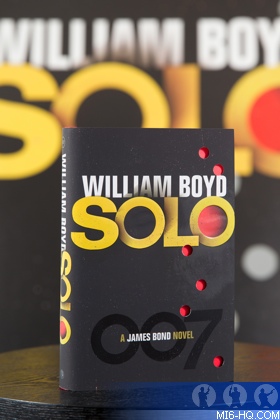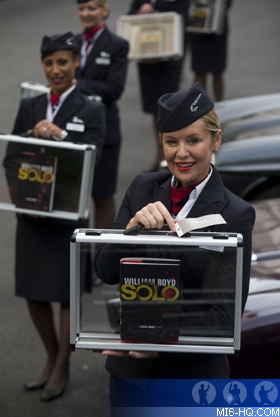|
|
|
Not to say that the mantle of 'new James Bond continuation author' is a poisoned chalice, but it's certainly not been as snug a fit for its recent owners as that iconic shoulder holster always has been for 007. Since the publication of "Devil May Care" (2008) and "Carte Blanche" (2011), both Sebastian Faulks and Jeffrey Deaver have received their fair share of flak from Fleming die-hards for their respective novels - and noticeably neither's received the call-back for a sequel from Ian Fleming Publications, purveyors of the literary Bond brand.
In fact, IFP have a new torchbearer, acclaimed author William Boyd, and he's given us "Solo", an adventure that sees 007 trying to end 'a dirty little' African civil war in the whirlwind of change that was the late 1960s. Credit where it's due, of this modern trio of Fleming-successors, Boyd has definitely managed in "Solo" to bring readers the closest to the original Bond. Is that the best thing that can be said of "Solo", though? Probably, yes; but coming after Faulks' and Deaver's efforts, it's certainly not something to be scoffed at either.
Indeed, owing to his hearty stab at 'Fleming faithfulness', there's much to like about Boyd's novel. Firstly, to this reader's mind, Boyd gets right both that Fleming-esque terse but vibrant, journalistic writing style and the Bond character. Not only is Bond replete with those wiles and that wit, that danger and that brutality, and that classiness and that stubbornness which so delight Fleming fans, but the author also builds on the 007 of the later Fleming novels by showing flashes of him starting to reflect on and accept middle-age - not only that well publicised 45th-birthday breakfast at The Dorchester in the first chapter, but also a grown-up mutual attraction with an equally confident, mature woman. |
|

Above: Solo on display at the star-studded launch party.
|
Boyd too delivers the requisite thrills, spills and violence, as well as pitch-perfectly Bond's ex-CIA agent chum Felix Leiter and curmudgeon boss M. Moreover, the minutiae of Bond's London home life are given the full treatment, which is rather unexpectedly refreshing. And, rest assured, there's also much attention paid to Bond's delectations: food and drink (among them Boyd's own recipes for a vodka Martini and a salad dressing); cars (here Jensens); cigarettes, clothes and weaponry. All vices very much intact then.

Above: 007 copies of Solo, ready to be dispatched throughout the world.
|
|
But - and it's a big but - "Solo" is less satisfying in two critical areas: the locations and the literary Bond's glamour/ surreality. There's nothing inherently wrong with sending our man to Africa and the fictitious war-ravaged country of Zanzarim (doing the latter allows the author artistic leg-room), but as the single setting for a long middle section of a Bond novel it's pretty bleak stuff - starving kids included. And, owing to this undiluted realistic setting, the villains our hero's up against aren't exactly the most electric - African warlords and savage white mercenary soldiers may be just as evil and physically threatening as an Auric Goldfinger or an Ernst Stavro Blofeld, but they're less fantastic and fun, so ultimately less memorable.
Additionally, when we're done in Africa, Bond, yes, 'goes solo' and travels to Washington D.C. His going AWOL in the films may be controversial ("Licence to Kill", "Die Another Day" and "Quantum of Solace"), but Boyd knows what he's doing with his admittedly convoluted plotting here, never allowing Bond to go full-Liam Neeson-in-"Taken" mode. Instead, it's the use of Washington as the book's secondary location that misses the mark. |
Effectively a political capital with a dirty 1960s' underbelly, it's just rather dull for the Bondiverse. At times we get glimpses of the more exotic aspects of late '60s Americana (assertive black women in afros and flares and red Mustang sportscars), but these are fleeting, surprisingly bringing to mind the cinematic "Live and Let Die" and "Diamonds are Forever" and thus making one ponder why Boyd didn't go the whole hog and just send Bond to the then equally dirty but far more colourful and interesting New York City?
Ultimately, it feels a little unfair comparing a Bond continuation author's effort to those of Fleming as surely no-one's really going to deliver the genuine article again, but it's both inevitable and necessary to do so. After all, as said, in significant areas Boyd is damn near spot on in "Solo". So, will he succeed where Faulks and Deaver failed and get a second stab at the gig? Who knows. But there's certainly a lot of promise here; his middle-aged 007 entering the '70s could be intriguing (especially given the novel's agreeable end coda), if only he could throw a little more of that Fleming glamour, dynamism and surreal magic into the mix.
About The Author
Adam is a writing and editing professional working in the UK. He has a passion for all things retro, and blogs regularly about music, TV, sport celebrities and movies from '60s, '70s and '80s over at georgesjournal.org.
The opinions expressed in this review are those of the author and do not necessarily reflect those of MI6-HQ.com or its owners.
|
|
|